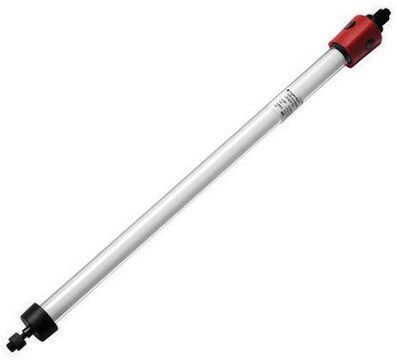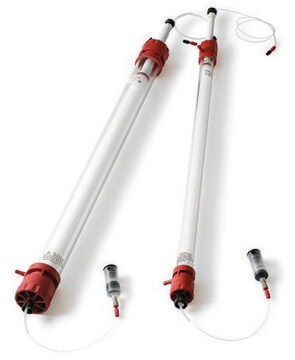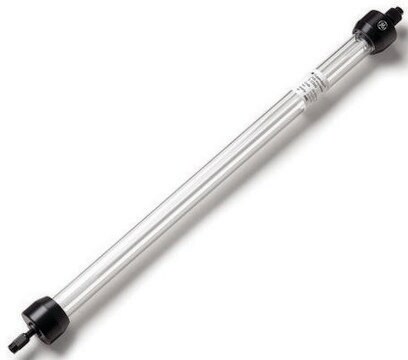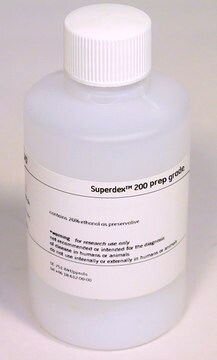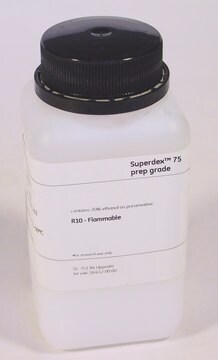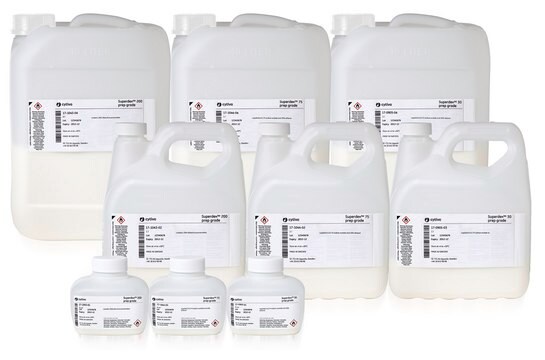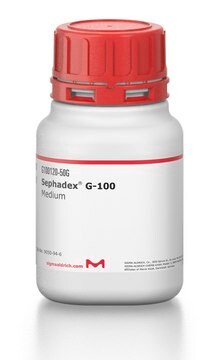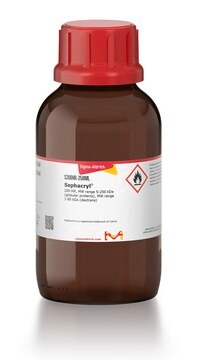S6782
Superdex®
Superdex®200 Prep Grade
Synonym(e):
Size exclusion media, Superdex column
Anmeldenzur Ansicht organisationsspezifischer und vertraglich vereinbarter Preise
Alle Fotos(1)
About This Item
Empfohlene Produkte
Qualitätsniveau
Form
suspension (20% aqueous ethanol)
Methode(n)
protein array: suitable
Matrix
cross-linked agarose
Partikelgröße
24-44 μm
Porengröße
1-100 kDa MW range (dextrans)
10-600 kDa MW range (proteins)
pH Betriebsbereich
1-14(short term)
3-12(long term)
Lagertemp.
2-8°C
Suchen Sie nach ähnlichen Produkten? Aufrufen Leitfaden zum Produktvergleich
Allgemeine Beschreibung
Vereint die hohe Selektivität einer Sephadex-Matrix mit der chemischen und physikalischen Stabilität der vernetzten Agarose.
Anwendung
Optimiert für hochauflösende präparative Trennungen.
Superdex® is used for protein chromatography, gel filtration chromatography, gel filtration media, resins and separation media. Superdex® has been used for the purification and characterization of a novel laccase from the edible mushroom Hericium coralloides. Superdex® has also been used for the purification and mechanism exploration of a potential human hepatocellular carcinoma inhibitor from Bauhinia purpurea L. seeds.
Rechtliche Hinweise
Superdex is a registered trademark of Cytiva
Signalwort
Warning
H-Sätze
Gefahreneinstufungen
Flam. Liq. 3
Lagerklassenschlüssel
3 - Flammable liquids
WGK
WGK 3
Flammpunkt (°F)
104.0 °F
Flammpunkt (°C)
40 °C
Hier finden Sie alle aktuellen Versionen:
Besitzen Sie dieses Produkt bereits?
In der Dokumentenbibliothek finden Sie die Dokumentation zu den Produkten, die Sie kürzlich erworben haben.
Kunden haben sich ebenfalls angesehen
G Iberer et al.
Journal of chromatography. A, 921(1), 15-24 (2001-07-20)
In size-exclusion chromatography (SEC), proteins and peptides are separated according to their molecular size in solution. SEC is especially useful as an effective fractionation step to separate a vast amount of impurities from the components of interest and/or as final
J Oh et al.
Human molecular genetics, 9(3), 375-385 (2000-02-03)
Hermansky-Pudlak syndrome (HPS) is a rare autosomal recessive disorder in which oculocutaneous albinism, bleeding tendency and a ceroid-lipofuscin lysosomal storage disease result from defects of multiple cytoplasmic organelles: melanosomes, platelet dense granules and lysosomes. The HPS polypeptide, a 700 amino
Marcel Zamocky et al.
The Biochemical journal, 418(2), 443-451 (2008-11-13)
Phytopathogenic fungi such as the rice blast fungus Magnaporthe grisea are unique in having two catalase/peroxidase (KatG) paralogues located either intracellularly (KatG1) or extracellularly (KatG2). The coding genes have recently been shown to derive from a lateral gene transfer from
T Sato et al.
Journal of the American Society of Nephrology : JASN, 10(6), 1242-1252 (1999-06-11)
Mesangial cell (MC) injury is a characteristic feature in the early phase of Thy.1 nephritis. The present study investigates the contribution of complement to MC apoptosis in this experimental model of kidney disease in rats. Thy.1 nephritis was induced by
Anna Lundquist et al.
Biomedical chromatography : BMC, 20(1), 83-87 (2005-06-15)
We studied the effect of charged lipids or detergent on the retention of drugs and an oligonucleotide by immobilized liposome chromatography to characterize solute-membrane interactions. This is a novel approach in analysis of oligonucleotide-liposome interactions. The charged lipids (phosphatidylserine or
Unser Team von Wissenschaftlern verfügt über Erfahrung in allen Forschungsbereichen einschließlich Life Science, Materialwissenschaften, chemischer Synthese, Chromatographie, Analytik und vielen mehr..
Setzen Sie sich mit dem technischen Dienst in Verbindung.